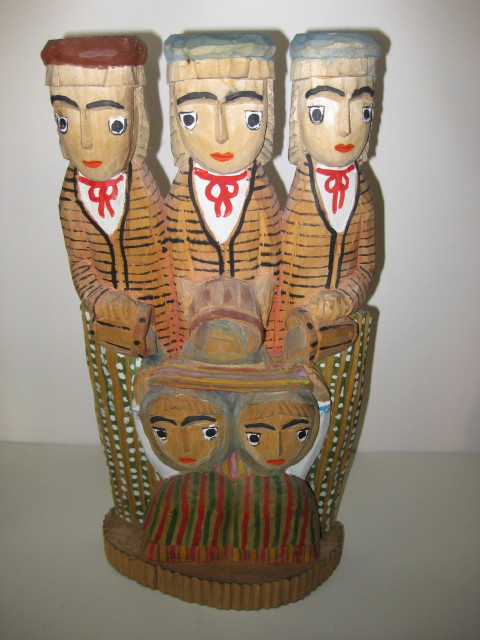Gallery: "poland"
I don't know if it says more about this year's kick-off party for the Sony Ericsson - or more about me - but the only players I recognized were Slavic women.
Jelena Jankovic sat with friends, frequently flashing her winning smile, while the Poles - Agnieszka and Urszula Radwanska, and Caroline Wozniacki (a Polish-Dane) - took to the dance floor. It was rather sweet to see Agnieszka dancing next to Caroline, who beat her at Indian Wells less than a week ago. Polish sisterhood.
I was tempted to go up to them and say something stupid. "Dobry wieczor" (Good evening) or "Co slychac?" (What's new?). Poles usually melt whenever a foreigner says something in Polish, but I had an inkling that wouldn't be the case this time. And besides, the music was so loud they wouldn't have had the slightest idea what language I was speaking.
Szkoda.
I went to the post office the other day.
"To Poland," the clerk said, taking my envelope.
"Yes, it's my book about Poland."
"Does it have pierogies in it?" the man asked.
"Yes," I said. "It mentions pierogies."
"And kielbasi? Does it have kielbasi too?"
I said there was a word or two about kielbasa.
Then the man told of his neighbor, a "Polish woman," who went out one day with a stick to throw to the dog, forgetting that she had her car keys in the same hand.
After all these years, the jokes continue. After Pope John Paul II and Lech Walesa. After Krzysztof Kieslowski and Ryszard Kapuscinski. Of course, the sort of people who tell Polish jokes have never heard of these last two men.
Mockery is often based on ignorance, even - perhaps especially - when ignorance is its imagined target. And in their cluelessness about Poland, many Americans are unaware that the country is, as the Polish journalist Adam Michnik recently said in a speech in Philadelphia, "the most pro-American in Europe, perhaps the world." They heap abuse on the one country that continues to show us love and respect.
So the joke's on whom?
At 7 this evening I will be speaking at the Museum of Contemporary Art in North Miami at a symposium titled: "Eyewitness to Revolution: Reflections on 1989." Suddenly, my outdated knowledge of Poland is valuable. Thank God for anniversaries.
But will it be well-received? I had a dream the other night that during my presentation not only people in the audience, but my fellow panelists, were talking amongst themselves.
Seventy years ago today Hitler invaded Poland and ushered in a half century of misfortune for its people. The war ended in 1945, but Communism followed shortly after, and Poland suffered - in addition to tremendous loss of life and massive emigration - the double curse of having its cities (with the exception of Krakow) destroyed by the Nazis and then rebuilt by the Soviets.
Igor Stravinsky reportedly said of Poland's geographical location: "If you pitch a tent in the middle of 5th Avenue, you're going to get hit by a bus." And, with the exception of the Tatra Mountains in the south, which today border that military powerhouse Slovakia, the land runs as flat as a Manhattan street.
It is also said that the first business to open in Warsaw after the war was a flower shop. Poles love flowers, and when I first heard this I thought it touching and eccentric, emphasizing the romantic over the practical and symbolizing the return of normalcy to daily life. Then I realized that the flowers were needed for all the fresh graves.
Easter Monday is a holiday in Poland (O to be in Poland, now that spring is there!). And, traditionally, it is the day when village boys chase village girls and douse them with water.
I have a modest collection of Polish folk art and one of the pieces depicts three young men in traditional dress pouring eternal buckets of water over two resigned and woeful young girls.
The act is an old fertility rite and, depending on your viewpoint, a precursor of the wet T-shirt contest. Not much celebrated in Poland now, Dyngus Day, as it is called there, is a big deal in Buffalo, NY, where parties are held throughout the city, including at the Mickiewicz Club. My goal is to one year usher in Lent in New Orleans and then usher it out in Buffalo.

Before it's over, I'd like to wish everyone a happy Fat Thursday, or Tlusty Czwartek as they say in Poland.
Poland's the only Catholic country I know of that celebrates the Thursday before Lent, but no Pole has ever been able to tell me why. People buy paczki (pronounced "ponchki"), delicous balls of fried dough (to call them doughnuts doesn't really do them justice) their moist and airy insides holding, ideally, small reserves of rose petal jam.
So, a paczek to the first person who explains to me the origin of Fat Thursday.